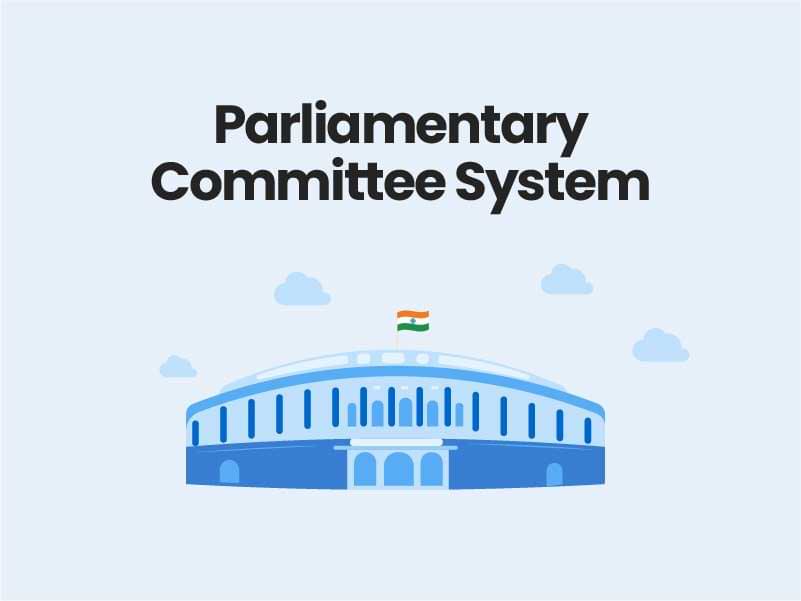Companion@360 → 7 Month programme to sharpen your writing skills → REGISTER NOW

Parliamentary Committee System
A Parliamentary Committee means a Committee which is appointed or elected by the House or nominated by the Speaker and which works under the direction of the Speaker and presents its report to the House or to the Speaker and the Secretariat for which is provided by the Lok Sabha Secretariat. Parliamentary Committees are of two types: Standing Committees and Ad hoc Committees. The origin of the Committee system in India can be traced back to the Constitutional Reforms of 1919.
Important Committees of Indian Parliament:
Business Advisory Committees: The main business of this Committee is to control the timetable of the House. The Committee may also make recommendations as to how much time should be given for the discussion of the various stages of a bill. The Business Advisory Committee submits a unanimous report to the House which the latter also adopts in tote.
Select Committees: These Committees are constituted when a motion that the said Bill be referred to a Select Committee is passed by the House. The Committee examines the bill clause by clause. It may make substantial amendments to the bill. The Committee then submits its report to the House.
Joint Committees: These Committees help the House to perform the business of legislation smoothly. It avoids duplication of legislation and thereby saves the time of Parliament.
Committees on Private Member’s bill: The main function of the Committee is to examine those bills which are introduced by the Private Members of the House. Further, the Committee sorts out such bills according to their contents, urgency, and importance.
Committee on Petitions: It is formed at the commencement of the House. The Committee examines the petitions submitted to the House by the People. The Committee takes proper evidence in each case and can suggest remedies to the House.
Committee on Privileges: The Committee examines all cases of breach of privileges of the House. It then submits its report to the House.
Rules Committee: According to the Constitution of India, each House of Parliament makes rules for regulating one conduct of its business. The Committee examines those rules and can also make recommendations for changes in them.
Committee on Subordinate Legislation: The main function of the Committee is to examine whether the delegated legislation is properly exercised in accordance with the rules and regulations conferred by the Constitution.
Estimates Committee: The chief function of the Committee is to consider the estimates or expenditure submitted to the Lok Sabha. It carefully examines the estimates of the different departments of Government. It can suggest recommendations for the economy. However, the Committee does not deal with the general policy of the Government, relating to the proposed expenditure. The Committee then submits recommendations to the House.
Committee on Government Assurance: The math business of the Committee is to see whether the assurances given by the ministers from time to time have been implemented. It also submits its report to the House.
Committee on Absence of Members from the sitting of House: The main function of the Committee is to examine the leave applications of those members of the House who have been absent for 60 days or more.
Public Accounts Committee: “The Public Accounts Committee is the twin brother of the Estimates Committee.” The Committee must have to satisfy itself that the public money has been spent by the different departments in accordance with the laws of Parliament. It also examines the report of the Comptroller and Auditor-General. The Committee in its report to the Lok Sabha points out the irregularities of different ministers and suggests remedial measures.
Significance of Parliamentary Committee System:
- The idea behind the committee system in Parliament is to provide a specialized forum for deliberation on policy issues.
- This ensures that the deliberations are not constrained by the limited number of sitting days as in the case of Parliament.
- Debates in committees are more technical and so, the deliberations require time and stretch for a few months.
- The purpose is to strengthen the administration by investing it with more meaningful parliamentary support.
- Committee meetings also provide a forum where members can engage with domain experts as well as senior-most officials of the concerned ministries.
- A considerable amount of legislative work gets done in these smaller units of MPs from both Houses, across political parties
The work done by the Parliament in modern times is not only varied in nature but considerable in volume. Committees relieve the Parliament of its burden. They also, save time and give an expert opinion on the subject.

